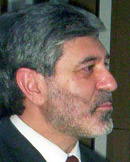– Due to your position you are informed about the economic relations between the EU and Armenia. What specific economic components are there in the New Neighborhood Policy and Eastern Partnership projects, which could have executive influence on Armenia?
– I would break the EU-Armenia relations in four parts. The first part was the material aids phase, when the EU was supporting Armenia with material aids. In the future this project was named as TACIS, which could be considered as the second phase. The projects of the TACIS were wider and involved not only aids, but creation of systems as well. The third phase in the relation between the EU and Armenia was the New Neighborhood Policy. It involves a separate action plan for every country. Thus, every country builds relations with the EU separately. If we look at the title of this project it tells us about the content of the project. It means that the EU wants to have stabile and wealthy neighbors. And the last phase, the fourth phase is the Eastern Partnership Project. Again the title says everything. Pathetically we may say that the enlargement of the EU to the East is limited with six countries. Maybe in far future these countries may become members of the EU as well. This project contains all the components that are necessary for a wider integration, i.e. for creation of an independent trade zone between these countries, more favorable regime for entry visas and energetic cooperation. The Eastern Partnership is a very flexible system. It means that every country can take as much as it can, in other words every country can accept and take as much as it can afford in the framework of its development level. This is more specific project and they can imitate with certain processes that you are a partner for the EU, thus every country is expected to make a certain policy and steps.
– Both the Eastern partnership and the New Neighborhood Policy contain specific tools and mechanisms for economic relations. When do you think such tools may be used and when can we expect concrete results?
– It is a long time that Armenia is included in the GSP and enjoys privileges. It is an opportunity to enter the European market with some privileges. It is mutually beneficial. On the one hand Armenia is getting an opportunity to enter a market with a half billion wealthy consumers, on the one hand it gives an opportunity to the European consumers to choose between products and prices. It is a great opportunity for the Armenian economy to develop. If we compare the situation with our neighbors and the Russian market, it becomes clear that the EU market is more developed from the point of view of administrative procedures and legislation, neither it is corrupt and can pay for products. The GSP system could work without the Eastern Partnership Project as well and it started to bring good results 3-4 years ago already. However here are inner economic and as well as political issues. The problem is not the fact that our products cannot enter the European market but the fact that the export potential has fallen down during the past three years, and first of all it is connected with the rapid slump of the US dollar and Euro exchange rates against the Armenian dram. It turns out that as a result of having an expensive currency the price of our products is growing spontaneously as well. Plus, the world crisis had a negative impact as well. Besides that Armenia spends more money on transportation compared to these six countries.
– Do you think it is ever possible that Armenia may join the EU?
– We should consider the issue of EU integration not only from the technical point of view but from the point of view of mentality, in other words whether we are ready and whether we see ourselves in this system. For example, Switzerland, Norway and Iceland are not EU members but fully fit in that system. Alas Armenia, specifically the Armenian government, don’t fit with this system with their activities. It is the vice versa, the government officials think that the more this system develops in Armenia, the longer they will be able to keep the power. From this point of view there are very powerful forces in the government which are struggling against the steps and processes for membership through imitating that they are loyal to this policy.
This supplement has been produced with the assistance of the European Union. The content of this supplement is the sole responsibility of “168 Hours” Newspaper and can in no way be taken to reflect the views of the European Union

